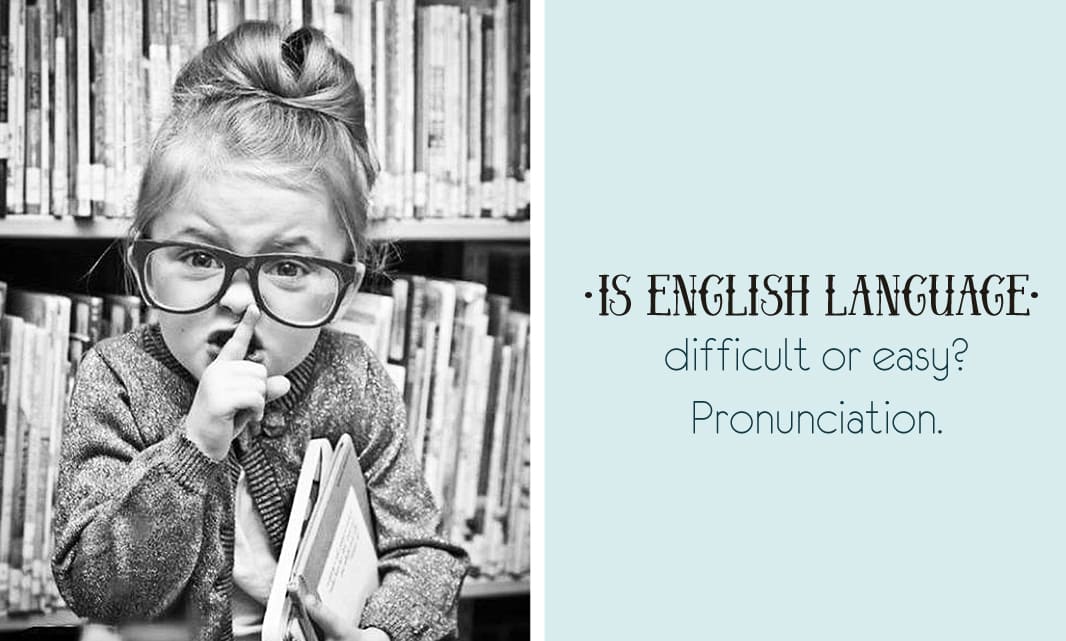Is English language difficult or easy? Pronunciation.
Easy from the point of view of grammar. Difficult from the point of view of speech understanding.Pronunciation – don’t develop complexes.

Is English language difficult or easy?
Lots of articles are written about this issue. There are lots of discussions on forums. The majority of people agree that English language is easy. But mainly discussion is focused on English grammar. And at the same time, many of those, who write about good knowledge of English language, admit that when they watch American or British movies, they understand less than 50% of it. And this is highly insufficient. What is the reason behind it? Cognition comes through comparison.
Cognition comes through comparison.If we compare English grammar with grammar of many other languages, it is indeed very easy. For many people its grammar will be fairly different from their mother tongue grammar. But it is not very hard to master. From this point of view English language is an easy language.
Different matter is an understanding of listening comprehension. English language has many diphthongs, many words that sound similar. To bring about understanding of English is not that easy. And from this point of view English language is a difficult language.
It all depends on what goal you set while learning English. If you need to read and write – you will need one approach in learning. But if you want to learn how to talk in English and this means that you have to understand what people say to you, then you have to follow next major principles:
Learn English not with your eyes, but with your ears – listen and repeat as much as possible.
Don’t learn words – learn phrases (That way you simultaneously learn how to use words and grammar correctly).
Don’t learn grammar rules (it’s a waste of time)
Try to master your knowledge of grammar to perfection.
It seems like last two rules are totally contradictive. But let’s think. When American or British child goes to school, can he explain what is Present Continuous Tense or Present Perfect Tense, according to what rules these tenses should be formed and how they are used? I doubt that. But they flawlessly use these tenses in their speech. They have already mastered English grammar at very high level. Exactly the same is applicable to the children who speak more difficult languages from the point of view of grammar. By age of 7 children know their mother tongue grammar at very good level.
If you want to understand English speech, if you want to speak English – learn it in the same way as children learn it.
Pronunciation.
At many websites of English language courses for children you can read an insistent advice that if you sign up your children to their course, their teachers will start teaching your children correct pronunciation from the very beginning because it is difficult to improve it if you learned it wrong from the start and etc.Here is my question, and what pronunciation is called “correct”. In Great Britain itself there are four major dialects. And all of them are “correct“. Maybe this is the way people speak it in Chicago? Or maybe in Huston? And what about India?
When I was in the lecture for ship engineers and for them the knowledge of English is essential, I was asked about my opinion about pronunciation of Indian sailors. And I asked counter-questions.
Do they understand what American and British sailors say to them? – Yes. Are they understood in return? – Yes. In that case I am absolutely OK with their pronunciation.
You are visiting a bar in Philadelphia. Making order. Talking about the weather. Asking about the name of a singer who is performing on TV. Bartender is asking where are you from. And you answer that you are from Poland (Czech, Sweden, Russia). He tells you that he thought that you are from Australia. I am sure you will not be offended that someone thought that you are from Australia.
At the forum of British Council, a woman from India (apparently recently immigrated to UK) is very anxious that she and her child speak English with a strong accent and everyone is trying to calm her.
Of course, it is a pleasure if an American or British cannot determine that you are a foreigner. But pronunciation is for real important only in one case – if you are going to work as a spy engaged in a covert operation. Only in that case your pronunciation must be relevant to your legend.
Conclusion: If you will be helping your child to learn English, DO NOT WORRY ABOUT YOUR PRONUNCIATION.
If a child will hear a lot of original English speech, at certain point HE WILL CORRECT YOU, when you pronounce some words wrong.




